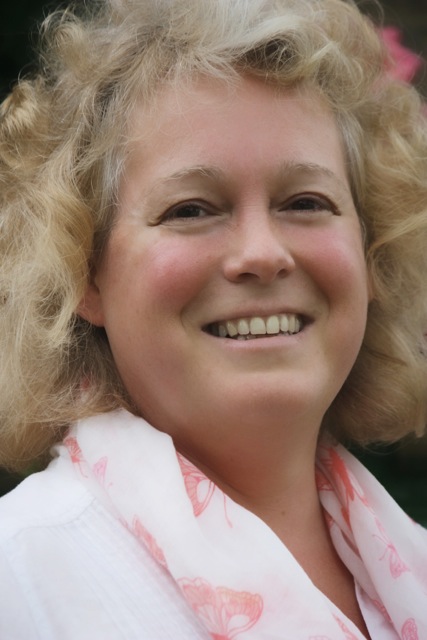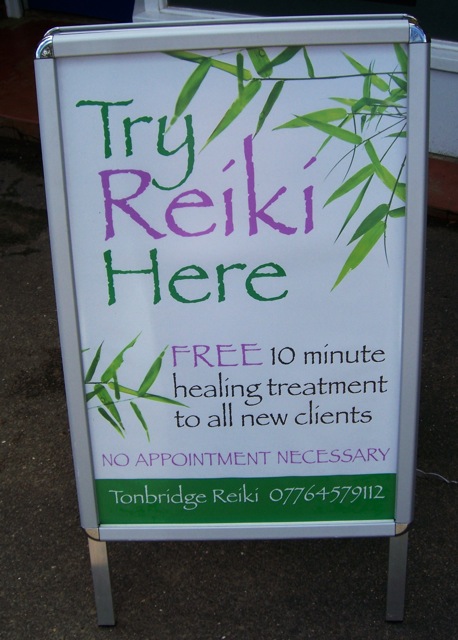A Reiki professional emailed her regrets. She cannot attend the Communicating Reiki Mainstream talk in London next week. I’ll miss seeing her, but she gave an excuse that made my heart sing.
Using the principles outlined in my last class in London, Tonbridge Reiki has grown to three locations, offering treatment to 100 people each week, with events scheduled months in advance.
I asked Julie Yarrow to share details so you can grow your business and bring Reiki practice to more people. We need more successful, ethical Reiki professionals if we are to fulfill Hawayo Takata’s* dream that Reiki practice be as common as aspirin!
 How Tonbridge Reiki Is Bringing Reiki to the Business Community
How Tonbridge Reiki Is Bringing Reiki to the Business Community
by Julie Yarrow
Since I took the Reiki and Medicine course with Pamela Miles, Tonbridge Reiki has worked in three Solicitor Offices, one veterinarian office, a nursing home, an investment house, an accountant’s office, and a primary school.
Tonbridge Reiki is currently trialing at a solicitors office and at Kent Wildlife Trust. Trials with two schools and a dental practice will start in September.
On the day of Pamela’s Communicating Reiki Mainstream talk in London, we will be at a primary school’s summer festival offering Reiki treatment to families. After a 13-week trial, Tonbridge Reiki was contracted to offer short treatments to the school’s staff every two weeks.
About Tonbridge
Tonbridge Reiki started in 2009. Since then we have developed into a school. I now have two franchises, one in Faversham and one in Tunbridge Wells.
We encourage and support (through our own Credible Reiki Practitioner Course) our Second Degree students to set up their own practice, and to date, eight practitioners work both for themselves and in our clinics.
We hold monthly Reiki swaps at the three centres and five Reiki get-togethers every year.
Reiki professional training
Just as with other professions, we take pride in the work we do. It takes time to learn how to give a Reiki treatment. Reiki is a stand-alone profession, not an add on.
Tonbridge Reiki practitioners use a specific protocols. An experienced practitioner/teacher always accompanies new practitioners.
Besides their Reiki training, all our practitioners are trained how to greet a client, make them comfortable, offer treatment, and, by observing the Reiki Practitioner/Teacher they are working with, how to effectively communicate about what has happened during the treatment.
All practitioners are required to hold a current First Aid Certificate and come to an annual training. We tell them to be prepared to produce their Health and Safety polices, Risk Assessments, First Aid qualifications.
 Business practices
Business practices
Tonbridge Reiki has grown by offering trials to businesses so they can experience the benefits of Reiki treatment without a fee.
During the trials, two Reiki practitioners come to the workplace for one hour weekly or bi-weekly to give Reiki taster sessions (usually 10 minutes). We look upon it as educating the recipients firsthand as to what Reiki practise is and what it does.
In the UK, Reiki practice is not a regulated therapy, so we have developed our own standards. Business clients respect this.
We work with many practitioners, so we have written a terms and conditions statement and a staff handbook, and have addressed other legal requirements.
Tonbridge Reiki practitioners wear uniforms.
We do not follow the usual business practise of prompting clients to book a series of appointments before they leave their first appointment. We prefer to keep the responsibility of healing with the client, and wait for them to re-book when they are ready.
The practitioners get many new clients from the relationships they develop during the trials. We support our practitioners to work with those clients in their own workspace or at Tonbridge Reiki. We also share clients.
Client communication
For Tonbridge Reiki practitioners, client communication includes speaking to the administrators to arrange the visits, and speaking to the staff who receive Reiki treatment.
We tell our practitioners, “You are working with professional people, so be professional. The clients have to consider their legal responsibilities, so educate them to yours.”
Especially since the public is not well informed about Reiki practice, it is up to us to inform clients about our qualifications, and to talk about our continual professional development.
When taking Reiki into the work place, it is important to use language the clients understand, not Reiki speak. We are also clear on the outset that Reiki treatments are gently restorative and help to release stress.
Practitioners clearly communicate their qualifications, Reiki Practitioner or Reiki Practitioner/Teacher. We don’t use the term Reiki Master as it is not a job title used in the workplace.
Practitioners guide clients to reasonable expectations according to the time frame allotted. For example, a 10-minute session on the shoulders is a taster, not a treatment. We don’t have in-depth conversations with clients receiving tasters.
Some clients have their own experiences of Reiki that do not resonate with how we are trying to promote the practice. Our practitioners are trained to be kind. It is not for us to judge other practitioners who may not practise as we do. We do not know why or how that person has come to Reiki practice, but we can kindly and respectfully educate our clients as to how we practise.
The business people we treat in the clinics during their workday usually have no prior experience with complementary therapies, so we present Reiki practice as an effective way to de-stress during the day and go back to work. One client is a roofer who is quite happy to be treated during the day and go back to work clear headed and rejuvenated. These clients do not usually have any physical problems, but are quite stressed.
Documenting results
During the trials, we encourage anyone receiving samples to complete a questionnaire. We ask only age and sex. No identifying personal data are collected.
The questionnaire consists of an introduction as to why we are there, then a list of questions. Firstly, we ascertain what if any complementary therapies they are receiving (usually none). Then we ask how they feel before the treatment and how they feel afterwards, on a scale of 1 – 10.
We tally the increase (how many treatments were given, and how many showed improvement by one point, how many by two points, etc. ) and present that data to the employer at the end of the trial period.
Although the treatments have been very well received, so far, only the school has taken us up afterwards. However, we have all gained new clients because we have gotten to know the recipients very well during the trials.
Community service
We have just had our first ex-serviceman on a First degree course paid by a charity. Money has been set aside for him to become a professional practitioner when he is ready. We can’t wait to support him on his journey!
*Hawayo Takata and her Reiki master Chujiro Hayashi, a direct student of Reiki founder Mikao Usui, brought Reiki practice from Japan to the United States in the late 1930s.
_____________
Need help talking about Reiki? In the Communicating Reiki Mainstream talk, I share insights and strategies from 27 years of Reiki practice to help you improve your Reiki talk immediately. Here is where I’ll be this summer:
- London, England, Saturday, July 12
- Copenhagen, Denmark, Tuesday, July 15
- San Sebastian, Spain, Friday, July 18 — email me
- Paris, France, Wednesday, July 23
- Guernsey date and details to be announced — email me
Register here for any of the Communicating Reiki Mainstream talks. Let me help you get the word out about Reiki practice so others can get the benefits we already enjoy!
Can’t get to the talk? Listen to Mainstreaming Reiki on your computer or on your phone as you go.
